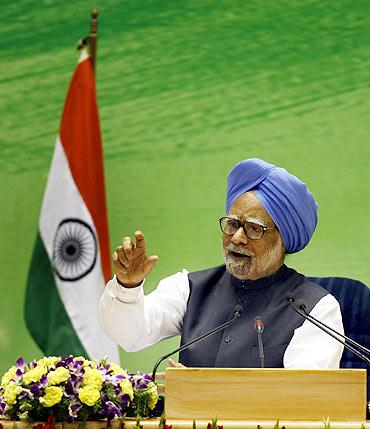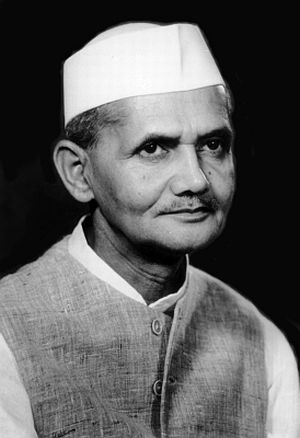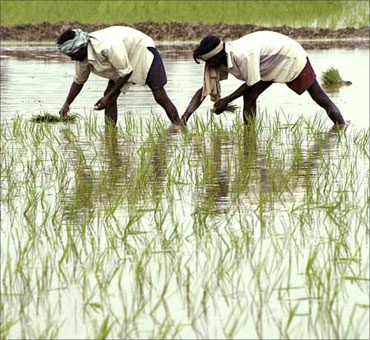Vivek Gumaste
Taking a cue from former prime minister Lal Bhadur Shastri, whose 46th death anniversary falls on January 10, Dr Manmohan Singh should break free of the inhibitory shackles that bind him to fulfill the expectations reposed in him by the people of India, says Vivek Gumaste.
The collective memory of a nation can be fickle, cruel and short-lived with large patches of amnesia that drown the good deeds of past patriots, relegate their sacrifices to the dustbins of our minds and rob us of the salutary counsel they provide.
At a time like this, of fratricidal political chaos sans any leadership, it is imperative that we recall a leader from our past: Lal Bahadur Shastri a seemingly nondescript individual, who rose to great heights, prompted by extraordinary circumstances and galvanised a crestfallen nation into a determined polity giving it a new vigor and a sense of purpose.
This exercise in remembrance serves as a reminder to the present generation of Indians, politicians and people alike that they do not have the right to squander away the gains from our past attained at great personal cost and sacrifice by this internecine bickering.
...
'Shastri's moderation, integrity made him ideal to succeed Nehru'
Image: Former Prime Minister Lal Bahadur ShastriWhen Nehru passed away in May 1964, the soft-spoken, short statured Shastri was hardly the man to succeed him; others in the Congress were more powerful and ambitious. But, when none of the frontrunners were able to garner adequate overall support, the high command settled on the non-controversial Shastri. His moderation, unimpeachable integrity and honesty made him an ideal compromise candidate, somewhat similar to Prime Minister Manmohan Singh's ascension to power.
In the days that followed, comparisons between Shastri and Nehru were inevitable and questions were galore. Could the uncharismatic Shastri fill the vacuum left behind by the legendary Nehru? Was he up to the job? The sequence of events over a short span of 18 months settled this question irrevocably. His confidence, his timely action and ability to inspire the people of India earned him a permanent place in the pantheon of Indian leaders.
The 1962 war with China had left India shattered and demoralised. Confident was not the word one would use to describe India in 1964 when Shastri took charge. Against the backdrop of this humiliating defeat, India was to face another crisis in 1965: war with Pakistan.
Shastri's deft handling of the situation and his heroic leadership lead us to a spectacular military victory that not only restored our pride and dignity but infused in us a confidence that was never to wane in the years to come. The 1965 victory was a prelude to the magnificent success of our armed forces in 1971.
...
'Shastri laid the foundation of the Green Revolution in India'
Image: Shastri laid the foundation for the Green RevolutionOn Independence Day, 1965, addressing the nation from the ramparts of the Red Fort, he declared, "Hathiyaron ka jawab hathiyaron se denge. (Force will be met with force.) Hamara desh rahega to hamara tiranga rahega. (Our flag will survive only if our country does)"
A few days later he followed up his words with decisive action. When Pakistan launched an attack across the international border in Chhamb and sought to cut off Kashmir from the rest of India, he had no qualms about asking his commanders to open up another front (even if it meant crossing the international border) to target Lahore.
That this strategy involved violation of an international border did not deter Shastri. Wasn't the Kashmir border transgressed by Pakistan an international border as well was his rejoinder. It was his prompt decisive stance that allowed the Indian army to reach within striking distance of Lahore and craft a spectacular military victory.
Compare this with India' hesitancy to cross the international border during the Kargil war; a tactic that would have considerably shortened the campaign.
The other major issue in which Shastri demonstrated his able leadership was the food crisis. A series of droughts coupled with diminishing agricultural productivity had left India in the unenviable position of having to depend on large quantities of foreign imports (especially from the United States under the PL-480 plan) for its day to day needs.
The US, then a staunch allay of Pakistan, attempted to pressurise India by abruptly terminating the PL-480 plan and replacing it with intermittent supplies of limited quantities that were inferior in quality. This pressure and humiliation only heightened Shastri's resolve to make India self-sufficient in terms of food. He laid the foundation for the Green Revolution that was to reap dividends after his death and forever erase the image of India as a beggar with a begging bowel.
...
'Shastri was a leader who led from the front and by personal example'
Image: Former prime minister Lal Bahadur ShastriAlso, to save on the already depleted stores of food grains, Lal Bahadur Shastri hit upon a novel idea. He surmised: If one person gives up one meal in a day, some other person gets his only meal of the day.
He appealed to all Indians to forego one meal a week but not before he had made his own family the guinea pig for this experiment. He was a leader who led from the front and by personal example. All Indians, commercial establishments included responded to his call without a murmur of protest -- the sense of unity that he engendered was remarkable.
This soft-spoken, non-descript little man who had followed the iconic Nehru had transformed himself into an exemplary leader to meet the need of the nation. His courage, forthrightness and simplicity endeared him to the Indian people and earned him a place in their hearts forever. His inspiring slogan, 'Jai Jawan, Jai Kishan,' rang throughout the country imbuing people with fresh optimism.
Extraordinary situations demand extraordinary leadership and can bring out the best in the most unlikely of individuals. Maybe lurking somewhere within our present, self-effacing honest prime minister is a spark; a spark that can be lit by the example of Lal Bhadur Shastri and one which will make him break free of the inhibitory shackles that bind him, one that will make him rise to the occasion to fulfill the expectations reposed in him by the people of India.
(January 11, 2012, marks the 46th death anniversary of Lal Bahadur Shastri, India's second prime minister)





article